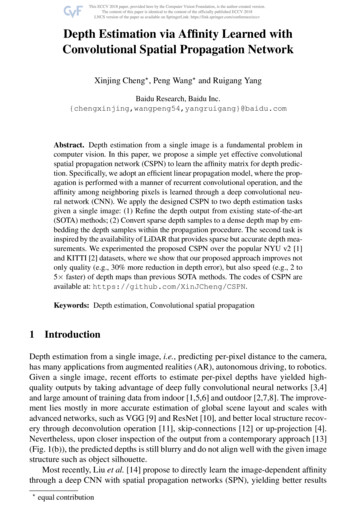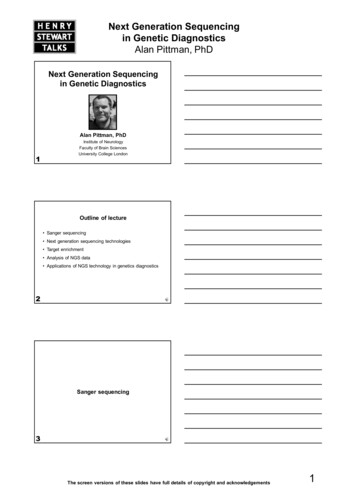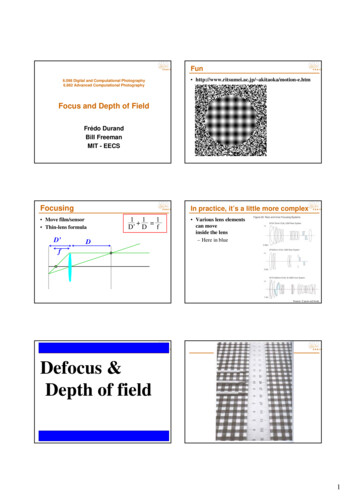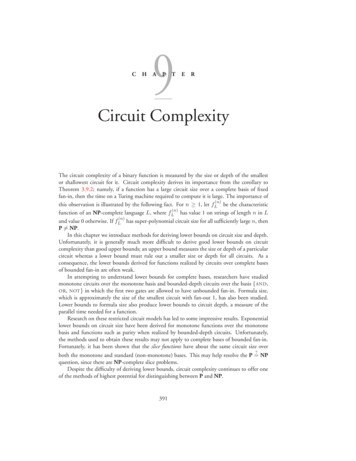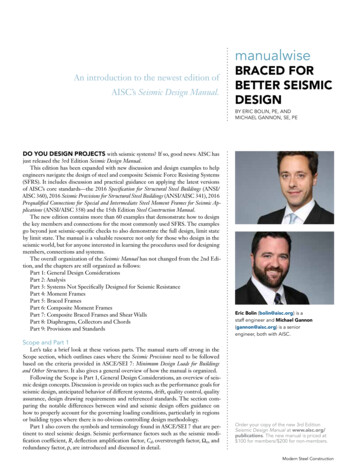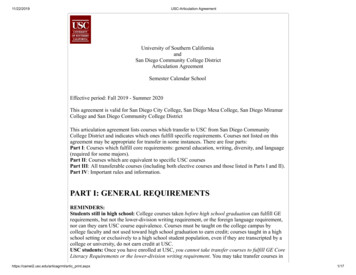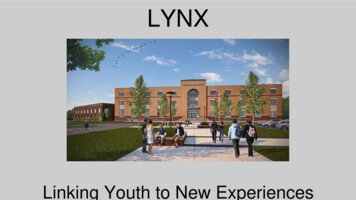
Transcription
In-depth courses from HSTalksThe Biomedical &Life SciencesCollectionCANCERGENETICSA complete advanced undergraduate/graduate course with:16 online lectures by leading authoritiesResources for workshops, tutorials, journal clubs, projects and seminarsSuggested exam questions and model answersMultiple choice questions and answersRecommended reading: original papers and review articlesView the content of the course on ourwebsite: neticsView our in-depth HSTalks:www.hstalks.com/CoursesBrochure
Course module with video lectures, material for tutorials (case studies, projects,workshops and recommended reading), multiple choice questions and suggested examquestions with model answers. A comprehensive course on a subject of major importance.The material is especially designed to support research and teaching staff when presenting acomprehensive course at graduate or advanced undergraduate level with seminars, journalclubs, laboratory exercises, data workshops, online tests and end of course examinations.The course is also suitable for continuing professional development/education programmes.This brochure provides brief details of the complete module, including the lectures, lecturersand additional learning material.Who is the coursefor?The comprehensive material is especially suitable for teachersand researchers who wish to offer courses on specialistsubjects to small groups of students (or even a single student)when it is not possible to justify the time and expense ofpreparing, internally, a course or there is not the range ofexpertise available locally to do so. All the lecturers are highlyregarded experts in their fields and few institutions are likelyto have a comprehensive group of faculty members with asimilar range of experience and knowledge of the subjectmatter.The course material is designed to be used by local facultyand staff acting as course directors, tutors and mentors.The material is suitable for flipped classroom, blended, teamand distance learning courses.New courses are time consuming and expensive to create.These modules cut both the cost and the time, enabling awider range of options to be offered on specialist topics.Graduate students can take the courses, mentored by theirsupervisors, while pursuing their research.2Ideal for VirtualLearningEnvironments (VLE)All course material, including the additional learning material,is arranged in a standard format that allows easy embeddinginto virtual learning environments such as Moodle, Blackboard or your institute’s own system.Supportinglearning andteaching goalsIn an age when faculty and staff face ever greater demands onbudgets and time, these lectures and additional learningmaterial will be of great help when preparing and deliveringgraduate and advanced undergraduate courses.C A NC ER GENETICSwww.hstalks.com/biosci
Course SummaryCancer is a genetic disease because it is caused by mutations. Cancer Genetics is the disciplineof understanding the genetic processes underlying tumor development. Genetics play a uniquerole in the laboratory and in the clinic in understanding the mechanisms of transformation of anormal cell to cancer, prediction of the risk of developing cancer, early detection, prevention,prognosis and therapy. Nearly all cancers arise from a single cell harboring a combination ofinherited and/or somatic alterations in genetic material. Once initiated, cancer cellscontinuously evolve by acquiring additional and complex mutations in the genetic materialleading to uncontrolled cell proliferation (cell cycle deregulation) and spreading to otherorgans (metastasis). The complexity of genetic aberrations includes changes in chromosomenumber and structure, single nucleotide changes, DNA methylation and modifications innon-coding RNA, among many others. These mutations affect protein coding genes, noncoding DNA and epigenetic modifications.In the recent decades we have witnessed dramatic developments in the technologies availablefor analyzing genomes. Recent advances in genomic technologies and bioinformatics areproviding crucial tools to understand the role of genetics in mechanisms of transformation,progression, and metastasis of cancer cells. These advances are paving ways to achieve the goalof personalized treatment of cancer. The course on Cancer Genetics will address most of thesecutting-edge developments in cancer biology.Editor: Prof. Vundavalli MurtyColumbia University Medical Center, USAThe coursemodule isdesignedfor:3C ANC E R GEN ETICSThis course is of interest to a wide variety of audiencesincluding life-science students at graduate and postgraduatelevel, researchers studying the genetics of cancer, andclinicians involved with oncology.www.hstalks.com/biosci
Course LecturesGenetics and management of inherited cancer management-of-inherited-cancer-predis/?biosciClick letitthe lectureessto accProf. Joshua SchiffmanUniversity of Utah, hildhood-acute-leukemia/?bioscicytogenetics of childhood acute leukemiaDr. Susana RaimondiSt. Jude Children s Research Hospital, s-and-cancer/?biosciChromosometranslocations and cancerProf. Felix MitelmanLund University, loid-leukemia/?biosciAcutemyeloid leukemia: genetics, prognosis and treatmentsProf. Stephen NimerUniversity of Miami Health Care, ties in acute lymphoblastic leukemiaProf. Ching Hon PuiSt. Jude Children’s Hospital, n-hodgkin-lymphoma/?biosciMolecular genetics of non-Hodgkin lymphomaProf. Jude FitzgibbonUniversity of London, arian-cancer/?biosciGenetics of breast and ovarian cancerProf. Jeffrey WeitzelCity of Hope, mics-of-familial-renal-carcin/?bioscigenetics and genomics of familial renal carcinomaProf. Eamonn MaherUniversity of Cambridge, UK4C A NC ER GENETICSwww.hstalks.com/biosci
16 specially recorded, animated lecturesby world leading authoritiesGenomics of lung er/?biosciClick letitthe lectureessto accProf. Ramaswamy GovindanWashington University in St. Louis, USAThe genetics of -glioblastoma/?biosciDr. Hai YanDuke University School of Medicine, asis-1/?biosciGenetics of tumor metastasisProf. Robert WeinbergWhitehead Institute for Biomedical Research, USACML: genetic paradigm of targeted -of-targeted-therapy-1/?biosciProf. Michael W. DeiningerUniversity of Utah, USAThe non-coding RNA revolution in the cancer evolution-in-the-cancer-societ/?biosciDr. George CalinMD Anderson Cancer Center, s-in-guiding-therapy-in-ca/?biosciRole of molecular markers in guiding therapy in cancerProf. Joe DuffySt Vincent's University Hospital and University College Dublin, IrelandFunctionalcancer enomics/?biosciProf. Roderick BeijersbergenNetherlands Cancer Institute, The NetherlandsPharmacogenomics in cancer cancer-therapy/?biosciProf. Sharon MarshUniversity of Alberta, Canada5C A NC ER GENETICSwww.hstalks.com/biosci
Examples of Course MaterialsFor each lecture the course offers tutorials, workshops, recommended reading, multiple-choicequestions, and suggested exam questions with model answers.HST MoodleMy CoursesCancer GeneticsTutorial: The genetics and genomics of familial renal carcinomaLecturer: Prof. Eamonn Maher – University of Cambridge, UKPatient X has been diagnosed with renal cell carcinoma (RCC) and subsequently treated with a total nephrectomy. The following year thepatient approaches the genetics clinic as they become concerned that their healthy 9 year old child might also be at risk of this type of cancer.a) What factors in the medical history would indicate a greater likelihood of an inherited cause?b) Genetic testing is carried out using a gene panel, revealing a mutation in FH and providing a diagnosis of Hereditary Leiomyomatosiswith Renal Cell Carcinoma (HLRCC). What are some of the advantages and disadvantages of gene panel testing in RCC.c) How might this patient’s children be managed in light of their parent’s diagnosis and what are some of the difficulties with theserecommendations?Exam Questionsand ModelAnswersQuestion 1Not yetansweredMarked out of1.00Hereditary papillary renal cell carcinoma type 1 is a rare condition caused by constitutionalmutations in the MET gene. What characterizes this condition from a molecular perspectiveand how does this impact on management?AAB I123Flag questionEdit questionMultiple-choicequestions andanswersQuestion 4Which of the following is not a recognized cause of inherited renal cell carcinoma?Not yetansweredMarked out of1.00Select one:Flag questionEdit questiona) Birt Hogg Dube syndromeb) Constitutional SDHD mutationc) Von-Hippel Lindau diseased) Constitutional BAP1 mutatione) Lynch syndromeRecommended reading supporting each lecture: Original research papers and review articles1. Eng, C. (2008). SDHB - A gene for all tumors? Journal of the National Cancer Institute, 100(17), 1193-1195.2. Escudier, B., Eisen, T., Stadler, W. M., Szczylik, C., Oudard, S., Staehler, M., Bukowski, R. M. (2009). Sorafenib for treatment of renalcell carcinoma: Final efficacy and safety results of the phase III treatment approaches in renal cancer global evaluation trial. Journal ofClinical Oncology, 27(20), 3312-3318.3. Maher, E. R. (2011). Genetics of familial renal cancers. Nephron. Experimental Nephrology, 118(1), e21-6.4. Maher, E. R., Neumann, H. P., & Richard, S. (2011). von Hippel-Lindau disease: a clinical and scientific review. European Journal ofHuman Genetics: EJHG, 19(6), 617-23.5. Menko, F. H., Maher, E. R., Schmidt, L. S., Middelton, L. a., Aittomäki, K., Tomlinson, I., Linehan, W. M. (2014). Hereditaryleiomyomatosis and renal cell cancer (HLRCC): renal cancer risk, surveillance and treatment. Familial Cancer, 637-644.6. Schmidt, L., Duh, F. M., Chen, F., Kishida, T., Glenn, G., Choyke, P., Zbar, B. (1997). Germline and somatic mutations in the tyrosinekinase domain of the MET proto-oncogene in papillary renal carcinomas. Nature Genetics, 16(1), 68-73.6C ANC E R GEN ETICSwww.hstalks.com/biosci
How to access the courseExtracts of lectures can be viewed at hstalks.com/biosci/. The full length lectures can beviewed by all members of universities, colleges and medical schools currently subscribing toThe Biomedical & Life Sciences Collection. Institutions that do not subscribe to The Biomedical& Life Sciences Collection may take annual licenses at US 2,000 covering an unlimited numberof students.Full supporting material: video lectures, material for tutorials (case studies, projects, workshopsand recommended reading), multiple choice questions and suggested exam questions withmodel answers are provided to faculty members of subscribers.To subscribe, obtain additional information and/or the additional learning material contactDr. Eyal Kalie at eyalk@hstalks.com.Upload to your VLEThe complete course (lectures and additional learning material) can be loaded into Moodle,Blackboard and other virtual learning environments.7C A NC ER GENETICSwww.hstalks.com/biosci
HSTalks provides access to world class lectures by leading authorities from around theglobe, in one online resource.Our subscribers include a wide range of universities, medical schools, colleges, hospitals,government agencies and pharmaceutical companies.www.hstalks.comEmail: sales@hstalks.comTel: 44 207 164 6721Corporate HeadquartersRuskin House, 40/41 Museum StreetLondon WC1A 1LT, United KingdomCompany Registration Number: 04833828(England and Wales)To download a copy of this brochure,visit:hstalks.com/cgcom/cgwww.hstalks.
HST Moodle My Courses Cancer Genetics Tutorial: The genetics and genomics of familial renal carcinoma Lecturer: Prof. Eamonn Maher - University of Cambridge, UK Patient X has been diagnosed with renal cell carcinoma (RCC) and subsequently treated with a total nephrectomy. The following year the

